Key takeaways:
- Praise fosters motivation and strengthens connections, influencing behaviors and attitudes positively.
- Specific, genuine, and timely praise enhances impact and cultivates a culture of support and collaboration.
- Personalized recognition caters to individual preferences, making acknowledgment more meaningful and relevant.
- A balanced approach of praise and constructive feedback encourages growth and a supportive team atmosphere.
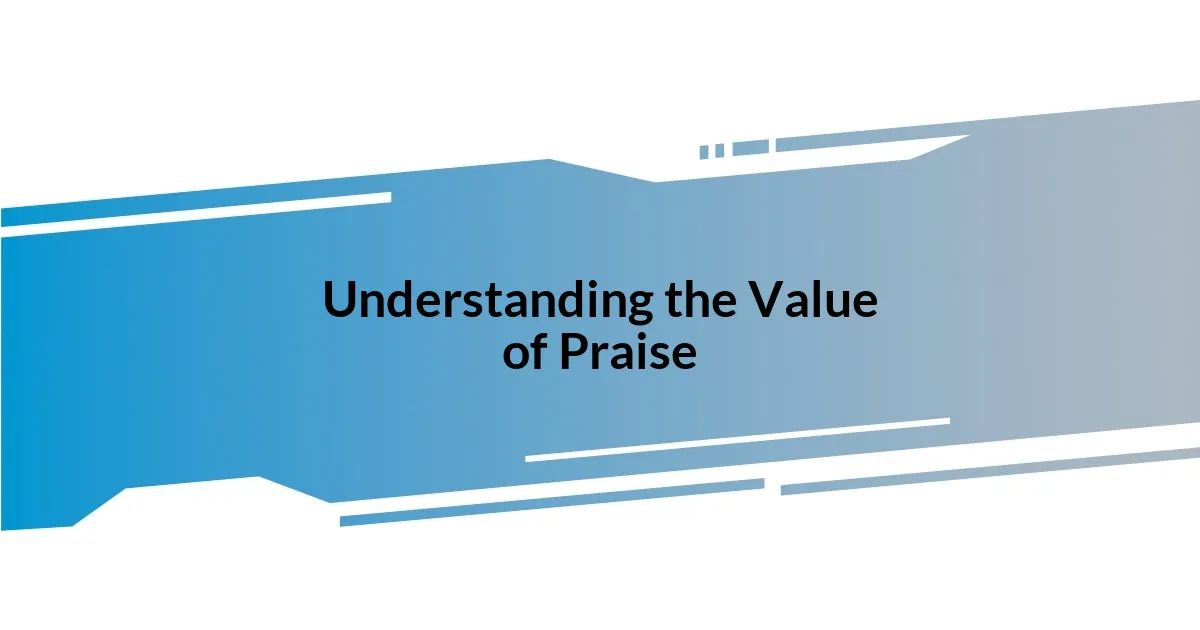
Understanding the Value of Praise
Praise holds incredible power, doesn’t it? I remember a time when a simple compliment from my boss transformed my entire week. It wasn’t just a boost to my ego; it ignited my passion for the project I was working on. That experience taught me that a few genuine words of affirmation can create ripples of motivation and engagement.
When I reflect on my own experiences, I realize that praise helps forge connections. Think about it: how often do you feel uplifted when someone acknowledges your hard work? This emotional upliftment goes beyond mere recognition; it fuels our drive to excel. It’s like a warmth that spreads, making us feel valued and appreciated in both personal and professional settings.
Moreover, praise acts as an important feedback loop. Have you ever considered how it shapes behaviors and attitudes? In my past roles, I noticed that when I praised my team members, not only did their performance improve, but it also fostered a culture of support and collaboration. It seems clear that understanding the value of praise can lead to a more motivated and cohesive environment.
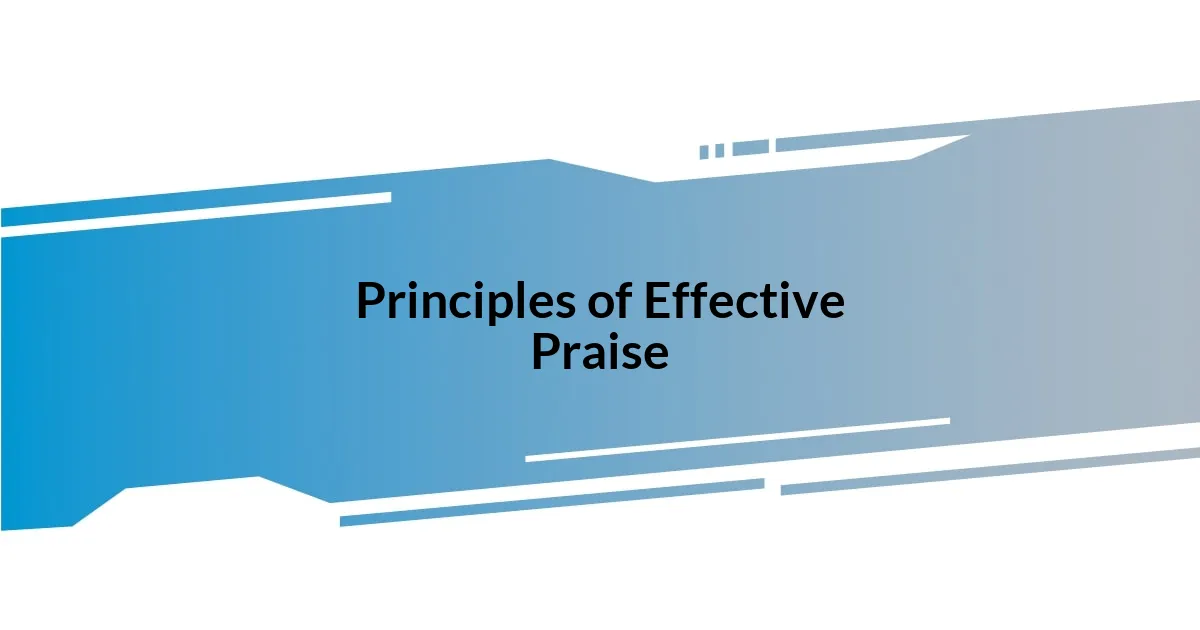
Principles of Effective Praise
When I think about the principles of effective praise, it reminds me of a wonderful mentor I had who always emphasized specificity. Instead of just saying “Great job,” she’d pinpoint exactly what I did well. I remember one time when I completed a detailed project, and she complimented my thoroughness in research and clear presentation. That focused praise not only made me feel truly seen, but it also provided me with a clear sense of what to continue doing in the future.
Incorporating specific elements into praise can make it much more impactful. Here are some key principles to keep in mind:
- Be Specific: Target exact actions or traits that deserve recognition.
- Be Genuine: Authentic praise resonates far deeper than obligatory compliments.
- Emphasize Effort: Acknowledging the hard work behind accomplishments fosters a growth mindset.
- Be Timely: Recognizing achievements promptly keeps the energy and motivation alive.
- Encourage Reflection: Invite the individual to share their thoughts on the praised behavior, building self-awareness.
Reflecting on these principles, I have seen firsthand how meaningful it is to be intentional about the words I choose. It adds layers to the connection I build with others and encourages repetition of positive behaviors.
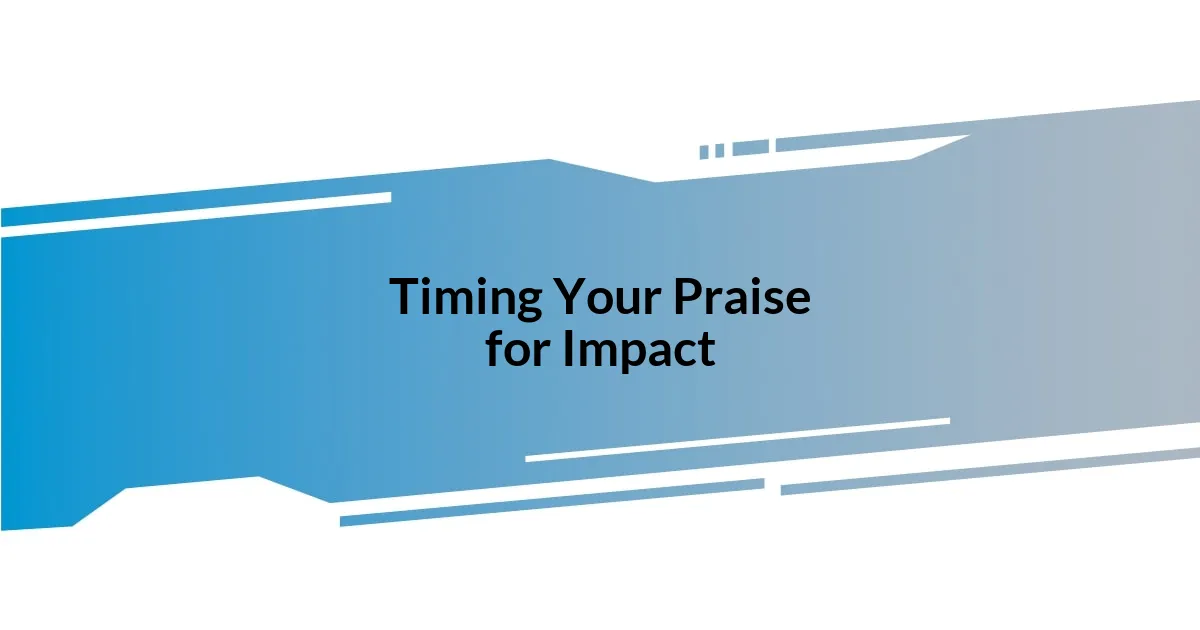
Timing Your Praise for Impact
Timing is crucial when it comes to delivering praise effectively. I’ve found that recognizing someone’s achievements immediately, rather than waiting, amplifies the positive impact. For example, after a team member successfully led a challenging project, I made it a point to thank them right away. Their eyes lit up, and the moment felt electric. It reinforced their behavior while the achievement was still fresh in their mind, making them eager to replicate that success.
Consider this: waiting to share praise might dilute its power. When I delayed complimenting a colleague until our quarterly review, the excitement seemed to fade. Sure, the acknowledgment was nice, but it lacked the urgency and joy of a spontaneous “well done.” It taught me that establishing a habit of immediate recognition not only preserves enthusiasm but also strengthens relationships. Timely praise acts like a booster shot of motivation, refreshing spirits and inspiring future efforts.
In practice, think about how often we miss opportunities to uplift others. During my weekly team meetings, I’ve started weaving in moments of acknowledgment for small wins right then and there. I can tell you, seeing smiles and hearing laughter makes the entire atmosphere lighter. It’s remarkable how a well-timed compliment can energize a whole group, creating a ripple effect of positivity.
| Timing of Praise | Impact |
|---|---|
| Immediate Praise | Boosts motivation and reinforces behavior. |
| Delayed Praise | May dilute excitement and connection. |
| Public Recognition | Encourages a team culture of support. |
| Private Praise | Builds personal bonds and deepens trust. |
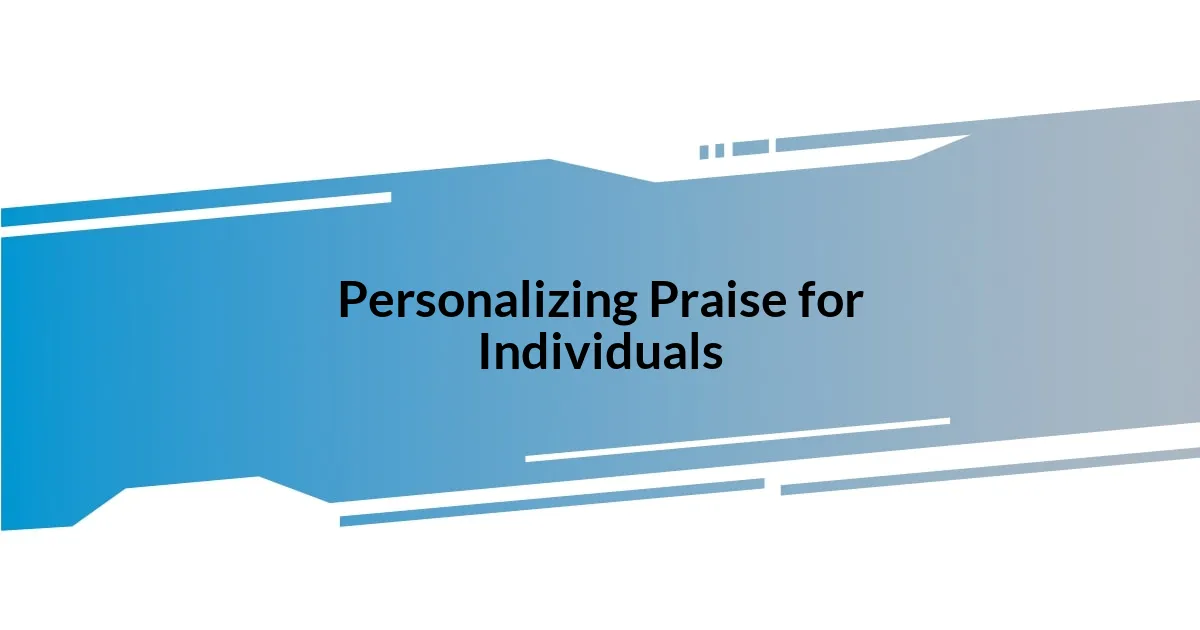
Personalizing Praise for Individuals
Personalizing praise is all about understanding the individual you’re acknowledging. I remember praising a friend for her creativity on a project, but it took me a while to realize that what really mattered to her was the collaboration aspect. By highlighting how her openness to others’ ideas improved the final outcome, I not only made my praise more relevant but also strengthened our working relationship. Have you ever considered how a small tweak in your praise can create a deeper connection?
I’ve learned that everyone appreciates recognition differently. For instance, while some thrive on public acknowledgment, others might feel more valued with a heartfelt note or a quiet chat. I’ve seen a teammate shine when I praised her innovative approach in front of the group, but it was the personal message I sent later that truly touched her. It was a reminder to me that a combination of public and private recognition can cater to different preferences.
Crafting personalized praise involves not just the words but also the delivery. Recently, I complimented a colleague on his analytical skills during a team meeting, and the look of joy on his face was unforgettable. In that moment, I could see that recognizing his unique strengths reinforced his confidence. Have you thought about how your words can uplift someone on a personal level?
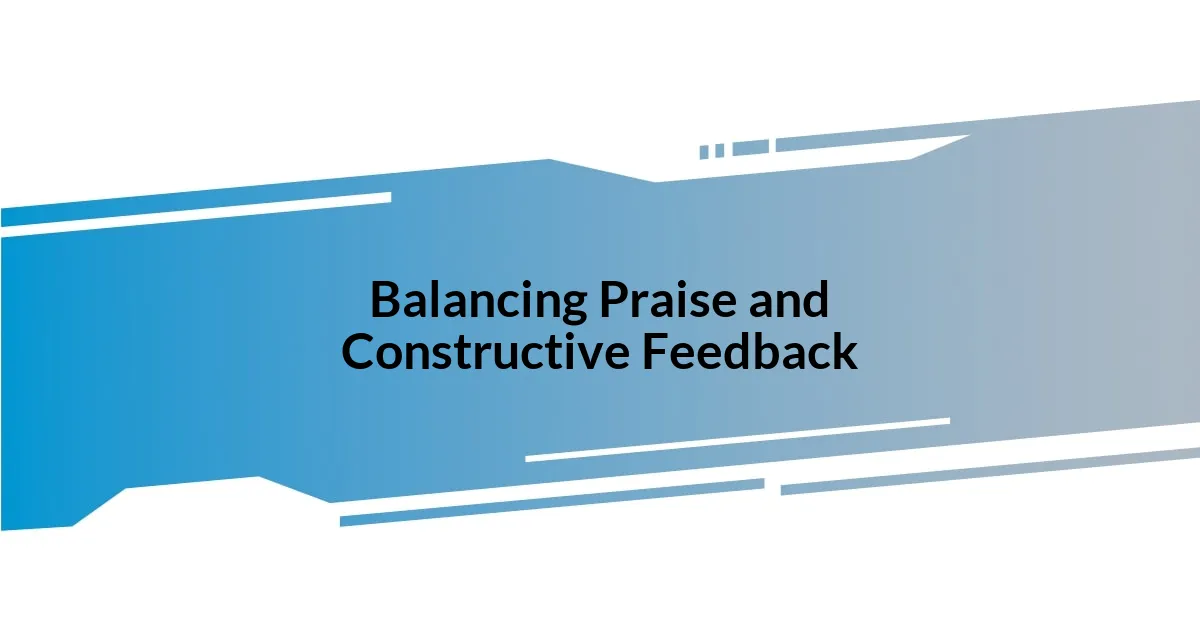
Balancing Praise and Constructive Feedback
Striking a balance between praise and constructive feedback can be a bit of a tightrope walk. I remember an instance where I praised a coworker for their creativity but failed to address the inconsistencies in their approach. It took me some time to realize that while celebrating their strengths was vital, guiding them towards improvement could have elevated their work even further. Don’t you think combining praise with constructive feedback can create a more well-rounded perspective?
When I finally understood the importance of this balance, I began to weave constructive feedback into my praises. For example, after complimenting a colleague on their presentation skills, I would also share my thoughts on how they could enhance their content organization. I noticed how much more open they were to my suggestions when they felt valued for their strengths. It’s interesting, right? The delivery truly makes a difference; it’s like nurturing growth by celebrating achievements while also paving the way for future enhancements.
Ultimately, I think about how this balance benefits the whole team. Noticing someone’s hard work, followed by gentle guidance, fosters a culture where people feel secure to experiment and learn. I’ve witnessed colleagues transform and thrive when they realize that feedback isn’t just criticism; it’s a pathway to improvement. Have you ever considered how a thoughtful blend of both praise and feedback can spark a supportive atmosphere in your workspace?
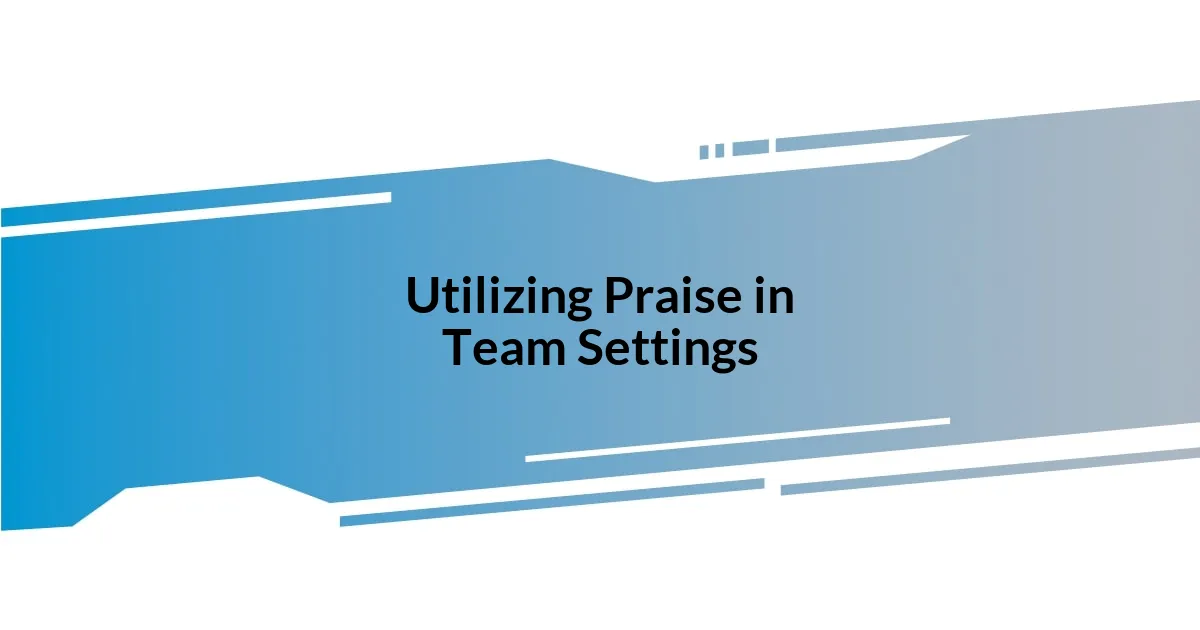
Utilizing Praise in Team Settings
In team settings, effective praise can ignite motivation and bolster collaboration. I remember a group project where we were all a bit overwhelmed. During a particularly challenging brainstorming session, I took a moment to acknowledge a teammate’s insightful contributions. The shift in energy was palpable—it felt like my words sparked a renewed sense of purpose among us, reminding everyone of the value they brought to the table. Have you ever seen a simple acknowledgment elevate a team’s morale?
Furthermore, there’s something special about group recognition. After successfully completing a project, I initiated a round of applause for everyone involved during our wrap-up meeting. I noticed that when each member heard their name mentioned, it fostered a sense of belonging and validation. It’s fascinating how celebrating individual contributions collectively can create a stronger team bond, isn’t it? This approach encourages everyone to take pride in their unique input while simultaneously nurturing community spirit.
While praising others, I’ve learned the importance of consistency. Regularly acknowledging efforts, both big and small, lays the groundwork for a supportive atmosphere. I often make it a point to express gratitude in team chats when someone goes the extra mile, creating a running dialogue of appreciation. This ongoing positivity helps everyone feel anchored in their roles and fosters a culture where excellence can thrive. Isn’t it amazing how a continuous flow of recognition can keep motivation high and teamwork strong?
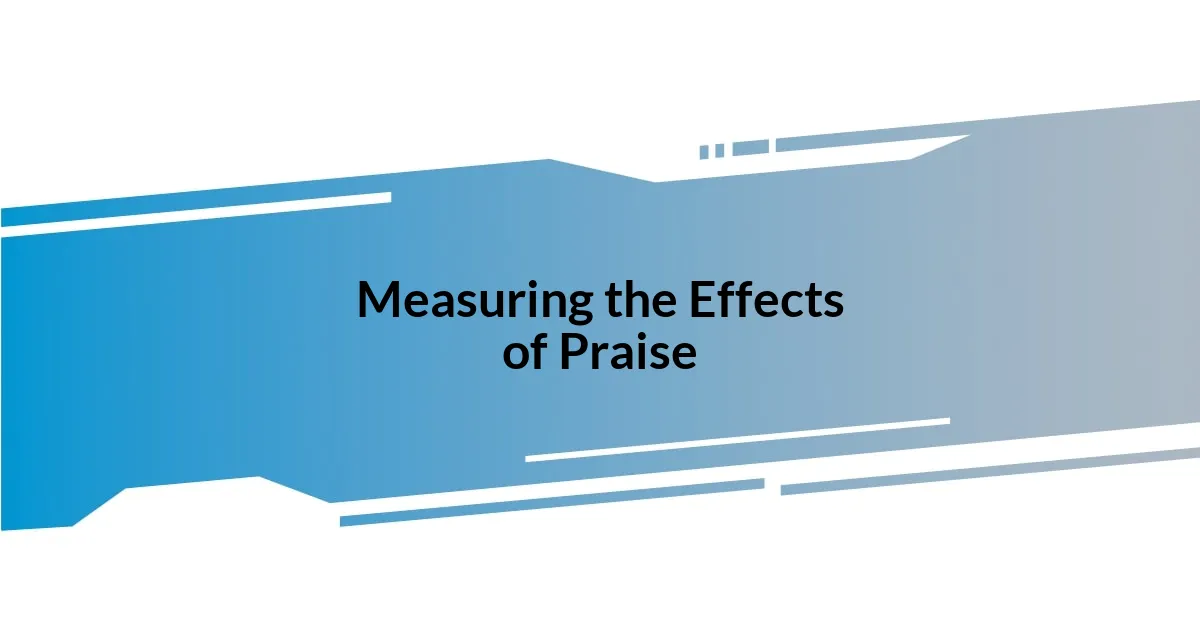
Measuring the Effects of Praise
Measuring the effects of praise is not always straightforward, but I’ve found it essential to track changes in behavior and performance. For instance, after implementing a weekly praise practice in my team, I noticed a significant uptick in engagement during meetings. It was almost as if the simple act of recognizing effort breathed life into our discussions—who wouldn’t want to contribute more when their work is being acknowledged?
I’ve also experimented with feedback surveys to gauge how team members felt about the praise they received. I recall one colleague sharing that the acknowledgment not only boosted their confidence but also encouraged them to take on more challenging tasks. This personal insight was illuminating—what a powerful reminder that praise can shift mindset and foster growth. Have you ever taken the time to ask someone how a compliment affected them?
Additionally, I’ve started paying attention to the long-term impact of my praise. I remember a situation where I recognized a junior employee for their quick thinking during a tough client meeting. Months later, they approached me about leading a new project, citing that my praise was a turning point for them. It’s moments like these that underscore the profound effect praise can have. How often do we underestimate the ripple effect of our words?